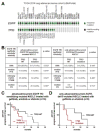Mutations in TP53, PIK3CA, PTEN and other genes in EGFR mutated lung cancers: Correlation with clinical outcomes
- PMID: 28285689
- PMCID: PMC5351777
- DOI: 10.1016/j.lungcan.2017.01.011
Mutations in TP53, PIK3CA, PTEN and other genes in EGFR mutated lung cancers: Correlation with clinical outcomes
Abstract
Introduction: The degree and duration of response to epidermal growth factor receptor (EGFR) inhibitors in EGFR mutated lung cancer are heterogeneous. We hypothesized that the concurrent genomic landscape of these tumors, which is currently unknown in view of the prevailing single gene assay diagnostic paradigm in clinical practice, could play a role in clinical outcomes and/or mechanisms of resistance.
Methods: We retrospectively probed our institutional lung cancer database for tumors with EGFR kinase domain mutations that were also evaluated by more comprehensive molecular profiling, and evaluated tumor response to EGFR tyrosine kinase inhibitors (TKIs).
Results: Out of 171 EGFR mutated tumor-patient cases, 20 were sequenced using at least a limited comprehensive genomic profiling platform. 50% harbored concurrent TP53 mutation, 10% PIK3CA mutation, 5% PTEN mutation, among others. The response rate to EGFR TKIs, the median progression-free survival (PFS) to TKIs, the percentage of EGFR-T790M TKI resistance and survival had higher trends in EGFR mutant/TP53 wild-type cases when compared to EGFR mutant/TP53 mutant tumors (all p >0.05 without statistical significance); with a significantly longer median PFS in EGFR-exon 19 deletion mutant/TP53 wild-type cancers treated with 1st generation EGFR TKIs (p=0.035).
Conclusions: Concurrent mutations, specifically TP53, are common in EGFR mutated lung cancer and may alter clinical outcomes. Additional cohorts will be needed to determine if comprehensive molecular profiling adds clinically relevant information to single gene assay identification in oncogene-driven lung cancers.
Keywords: Adenocarcinoma; EGFR; Erlotinib; Kinase inhibitor; Lung cancer; Mutation; PIK3CA; PTEN; TP53.
Copyright © 2017 Elsevier B.V. All rights reserved.
Conflict of interest statement
Daniel B. Costa has received consulting fees and honoraria from Pfizer Inc (unrelated to the current work), consulting fees from Ariad Pharmaceuticals (unrelated to the current work), and honoraria from Boehringer Ingelheim (unrelated to the current work).
Susan M. Mockus, Vanessa Spotlow, Honey Reddi, and Joan Malcolm are are employees of The Jackson Laboratory that developed the JAX-Cancer Treatment Profile genomic test (related to this work).
Deepa Rangachari, Mark S. Huberman, and Susumu S. Kobayashi have no conflicts to disclose.
No other conflict of interest is stated.
Figures



References
-
- Kobayashi S, Boggon TJ, Dayaram T, et al. EGFR mutation and resistance of non-small-cell lung cancer to gefitinib. N Engl J Med. 2005;352:786–92. - PubMed
MeSH terms
Substances
Grants and funding
LinkOut - more resources
Full Text Sources
Other Literature Sources
Medical
Research Materials
Miscellaneous

